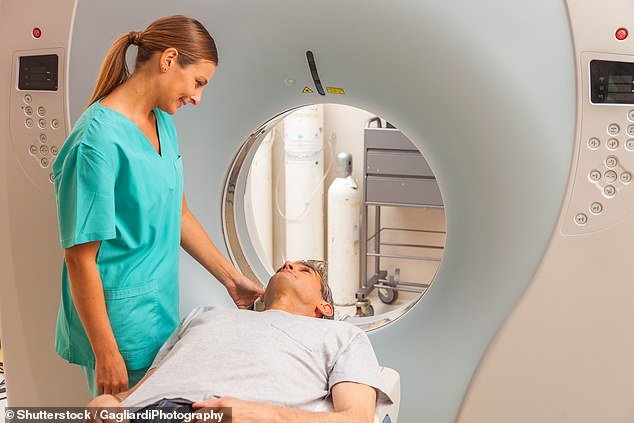Artificial intelligence could be twice as effective at diagnosing rare cancers as biopsies, a study has found.
British scientists developed a computer algorithm that correctly diagnosed the severity of sarcoma tumors in 82 percent of cases, compared to 44 percent of biopsies.
Experts say the technique could eventually become standard practice for all cancers, allowing thousands of patients each year to avoid the invasive procedure.
Such programs will also help doctors diagnose disease subtypes more quickly and tailor treatment more effectively, they believe.
Researchers used CT scans of 170 patients from Royal Marsden, London, with sarcoma tumors, an aggressive form of cancer that develops in the body’s connective tissues, such as fat, muscle and nerves.

The team from Royal Marsden and Institute of Cancer Research used a technique called radiomics to analyze the CT scan data
The results were used to develop an algorithm that was then tested on approximately 90 patients at cancer centers in Europe and the US.
The team from Royal Marsden and Institute of Cancer Research used a technique called radiomics to analyze the CT scan data, which can extract information about the patient’s disease from medical images, including data that cannot be discerned by the human eye.
They looked specifically at retroperitoneal sarcoma, which develops in the back of the abdomen and is difficult to diagnose and treat because of its location.
The technology accurately assessed how aggressive the tumor likely was in 82 percent of cases, while biopsies were accurate in 44 percent of cases.
AI was also able to distinguish between two types in 84 percent of sarcomas tested: leiomyosarcoma and liposarcoma, while radiologists could not tell the difference in 35 percent of cases.
Christina Messiou, consultant radiologist at Royal Marsden, said: ‘We are incredibly excited about the potential of this cutting-edge technology, which could lead to patients achieving better outcomes through faster diagnosis and more effective personalized treatment.
‘As patients with retroperitoneal sarcoma are routinely scanned with CT, we hope that this tool will eventually be used worldwide, so that not only specialist centers – who see sarcoma patients every day – can reliably identify and assess the disease.’
Professor Messiou added: ‘In the future, this approach could help characterize other types of cancer, not just retroperitoneal sarcoma.
‘Our new approach used features specific to this disease, but by refining the algorithm this technology could one day improve outcomes for thousands of patients each year.’
Sarcoma is a rare form of cancer with around 4,300 new cases diagnosed in England each year.
Earlier this year, Chancellor Jeremy Hunt spoke of his devastation at losing his brother Charlie to the disease aged 53.
Richard Davidson, CEO of Sarcoma UK, welcomed the findings, published in Lancet Oncology, and said the results ‘look promising’.
He said: ‘People are more likely to survive a sarcoma if their cancer is diagnosed early ? when treatments can be effective and before the sarcoma has spread to other parts of the body.
‘One in six people with sarcoma cancer wait more than a year for an accurate diagnosis, so any research that helps patients get better treatment, care, information and support is welcome.’
It comes after Prime Minister Rishi Sunak announced a ?100 million fund to boost research into previously incurable diseases using AI.
He said the technology could “help solve some of the biggest social challenges of our time,” including finding new treatments for dementia or developing vaccines against cancer.
Healthcare Minister Steve Barclay said: ‘AI has the potential to revolutionize cancer care by ending invasive procedures and speeding up diagnoses and treatments, which could be the difference between life and death.
‘The Government invests more than ?1.2 billion a year in research to unlock the next generation of treatments and diagnostic tools, and it’s fantastic to see this groundbreaking technology being embraced and benefiting NHS patients.’
